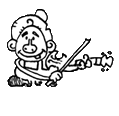Dan McLaughlin was 31 years old when he decided to quit his job and become a professional golfer. Minor detail: he didn’t really know how to play golf yet. And what does that have to do with learning the fiddle? It means that you if you play every day with focused deliberate practice, you can get really good at fiddling (or anything).
He came up with “The Dan Plan”. He had saved some money working as a professional photographer which allowed him to devote all his time to learning golf. He hired a coach and trained for 30+ hours a week. His goal was to make the PGA Tour Qualifying Tournament.
Practice over talent
Dan used the principles of deliberate practice pioneered by Dr. K Anders Ericsson, which state that practice is far more important than the idea of innate talent. Performance is improved through the use of feedback and daily practice with focused attention. Difficult skills are broken down into simpler skills and practiced with exercises. Then, the student continues to practice the skills at a higher level.
The best form of feedback is a teacher or a coach. In learning music a teacher or coach can offer guidance toward a goal. A teacher will help you focus your practice and give you exercises to help you improve specific skills and parts. This means that a student spends less time running though parts they already know and more time practicing exactly what they need to practice. A good teacher also knows all the pitfalls of learning a skill and so can help a student learn more quickly by avoiding trial-and-error approaches.
Be your own teacher
If you have not found a teacher, than you can be your own teacher. Music students can also collect feedback through recording themselves playing, listening back and practicing the difficult passages with exercises. When you listen back to a recording of yourself, you can more easily identify the parts that are hard for you. Once you know what to focus on, spend your time working on the parts that need attention. A huge part of my teaching approach is to design fun exercises that are based on difficult parts of tunes. In this way, you can learn and practice violin technique through fiddle tunes.
Dan started by just putting. He would putt close to the hole and as his confidence grew, he would work further and further away. He practiced with the putter for five months. You could translate his strategy to fiddling by starting with getting a good sound bowing on open strings. If it were up to me, I’d have students do nothing but bow on open strings for a month. (But most people would get bored or discouraged and quit if asked to do that, so I try to get them to just bow for at least a week). Once you can do that, then master a simple interval (two notes): D0-1. Then master D1-2, D2-3. Once each of these feels solid, you could try four notes: D0-1-2-3. Then try simple tunes like Bile ’em Cabbage Down, Fais Do Do and Mary Had a Little Lamb.
Just as Dan slowly moved the ball away from the hole, you could work from single open string notes to a multi-part tune.
Dan kept meticulous spreadsheets of his performance: shots that went too far to the left, too far to the right, as wells as stats from various points on the putting green. In the same way, you could track your practice using a journal or notebook.
He moved from the putter to the pitching wedge to the sand wedge and then finally to the driver. He didn’t move on to a larger club until he was really good at the smaller club. He practiced for over a year and a half before playing 18 holes of gold with a full set of clubs. What patience! In the same way, when we learn tunes, we try to master the simple ones before tackling the harder ones. You can always stay with a tune longer than you think, practice it in a different way or with a different focus (right hand focus, left hand focus, etc.)
When you learn a tune do you play all 18 rounds or do you focus on putting for awhile? I’m always trying to get students to slow down and stay with one simple thing for a long time until it sounds good. Like Mr. Miyagi showing Ralph Macchio how to wax on/wax off in The Karate Kid.
I want to add something that falls outside the realm of deliberate practice. Perhaps a more important goal than mastery is enjoyment. A lot of people want to achieve what a master has done. But when they start learning and practicing they get discouraged because they have so far to go. But if you take enjoyment as your goal, then you can reach your goal on a daily basis, which will spur on further practice.
As you continue to get this reward of good sound, you may start to become curious about how you practice. You will naturally streamline your sessions using the deliberate practice methods mentioned above. In this way you enter the path of practice and walk the mystical line between work and fun.


I’ve decided to stop learning new tunes recently (until you posted Fairytale of New York) and really work on and enjoy a handful of tunes I already know. Get these to a point where I REALLY know them. The goal is for someone to say ” hay Dave bring you’re Fiddle over here and regale us with that tune, Kerfunken Jig”…. Not oh no he’s picked that Fiddle thing up again….